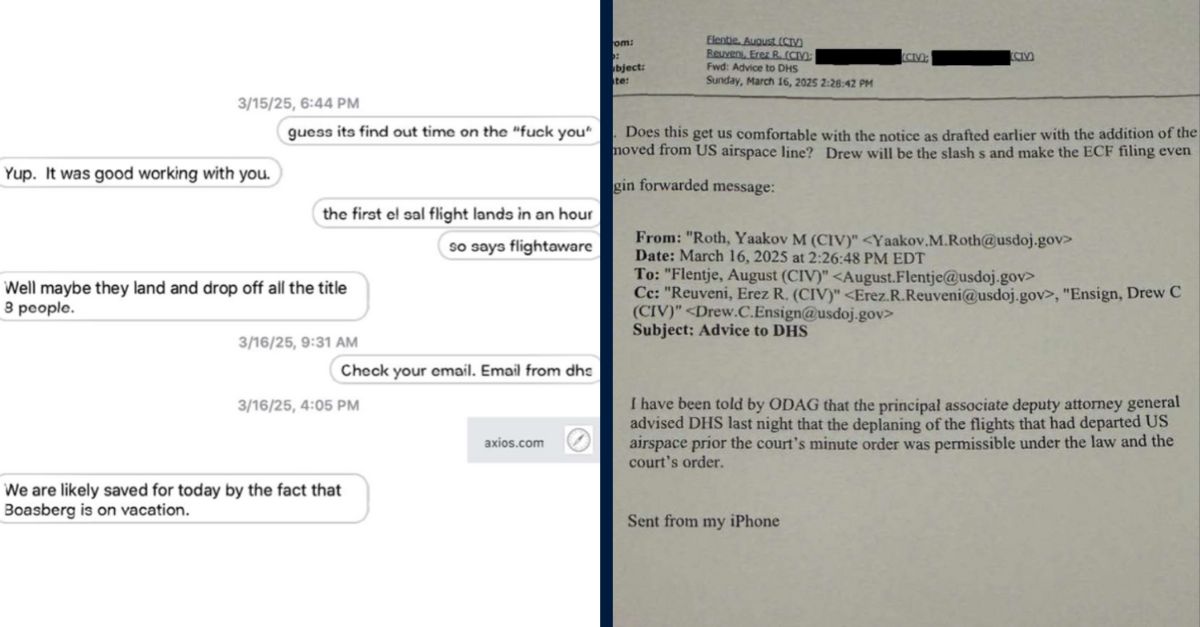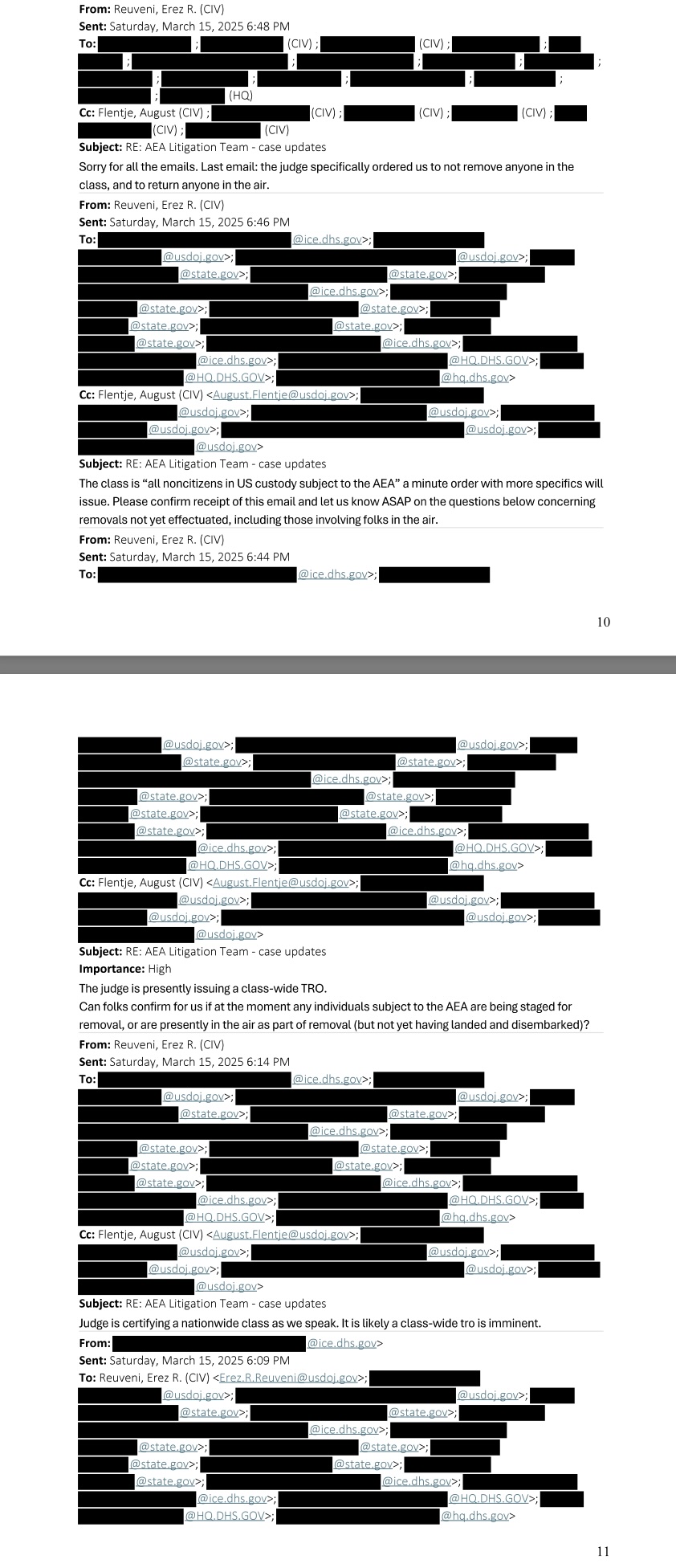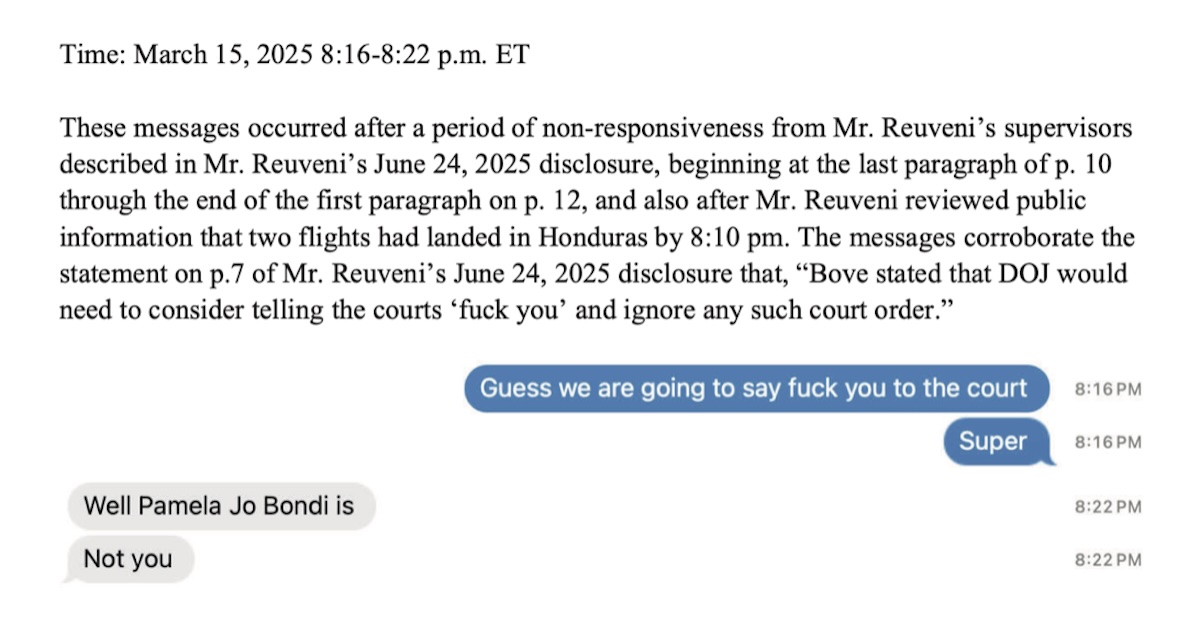Share this @internewscast.com
Accompanied by his attorneys Todd Blanche on the left and Emil Bove, former President Donald Trump awaits the commencement of proceedings in Manhattan Criminal Court, Tuesday, May 28, 2024, in New York (Image by Justin Lane/Pool Photo via AP).
Text conversations between a fired DOJ lawyer turned whistleblower and his then-supervisor appear to show behind-the-scenes discussions about the “f— you” to the courts that President Donald Trump”s nominee for a lifetime judgeship allegedly considered before a district judge tried in vain to rein in the executive’s mass deportation operation.
Erez Reuveni’s text messages, phone records, and DOJ internal emails, first reported by Politico on Thursday, took the form of more than a dozen exhibits to Reuveni’s whistleblower action. They begin on March 15, the day that Chief U.S. District Judge James Boasberg issued a rare weekend oral order — apparently with his own vacation looming — that the Trump administration could not move forward with Alien Enemies Act (AEA) removals of alleged gang members to El Salvador as planes were in the air.
The messages include Reuveni’s exchanges with his supervisor August Flentje, and their real-time reaction to Boasberg’s order in light of principal associate deputy attorney general Emil Bove’s alleged suggestion — the day before the court made a decision — that the DOJ might have to consider ignoring court orders.
“Guess it’s find out time on the ‘f— you,'” read a Reuveni text.
“Yup,” Flentje answered. “It was good working with you.”

Senate Judiciary Committee.
“The first el sal flight lands in an hour,” Reuveni answered. “So says flightaware.”
The time stamp for the exchange was 6:44 p.m. on March 15, which was the same date and time that Reuveni sent a “high” importance email informing ICE, DOJ, and DHS officials that Boasberg was issuing a temporary restraining order.
“The judge is presently issuing a class-wide TRO. Can folks confirm for us if at the moment any individuals subject to the AEA are being staged for removal or are presently in the air as part of removal (but not having landed and disembarked)?” Reuveni asked.

Senate Judiciary Committee
A mere four minutes later, Reuveni made clear that Boasberg “specifically ordered us not to remove anyone in the [AEA] class, and to return anyone in the air.”
Later that night, Reuveni sent another text to a colleague saying “Guess we are going to say f— you to the court. Super.”

Senate Judiciary Committee.
The next day, DOJ attorney Yaakov Roth sent an email to Flentje, with Reuveni copied on the message, writing that Bove “advised DHS last night that the deplaning of the flights that had departed US airspace” prior to Boasberg’s order “was permissible under the law and the court’s order.”
Both Reuveni’s concerns and Boasberg’s court order were ignored, and criminal contempt proceedings followed.
Love true crime? Sign up for our newsletter, The Law&Crime Docket, to get the latest real-life crime stories delivered right to your inbox.
But that wasn’t the only fallout.
Reuveni was placed on leave and then fired in April after he said he “refused directions from his superiors to file a brief misrepresenting” facts about Kilmar Abrego Garcia. It was Reuveni who said in court that Abrego Garcia “should not have been removed,” leading the DOJ veteran’s swift ouster.
Reuveni was fired after nearly 15 years at the DOJ for “failure to follow a directive from your superiors; failure to zealously advocate on behalf of the United States; and engaging in conduct prejudicial to your client,” according to Deputy Attorney General Todd Blanche, another former Trump criminal defense lawyer who worked with Bove on the Mar-a-Lago and hush-money cases, helping the president to avoid convictions in one case but for one and not the other.
Blanche also branded Reuveni as a “disgruntled former employee” who was using Bove’s nomination for a judgeship at the 3rd U.S. Circuit Court of Appeals to lash out with “false” claims that Bove had suggested giving the courts an “f— you” if blocked from carrying out mass deportations pursuant to AEA, an 18th-century wartime law that has only been invoked three times in American history.
“I was at the meeting described in the article and at no time did anyone suggest a court order should not be followed,” Blanche said at the time on X, remarking on the New York Times’ decision to cover Reuveni’s allegations on the eve of Bove’s hearing before the Senate Judiciary Committee. “This is disgusting journalism. Planting a false hit piece the day before a confirmation hearing is something we have come to expect from the media, but it does not mean it should be tolerated.”
During the June 25 hearing, Bove stated he has “never advised a Department of Justice attorney to violate a court order” and “did not suggest that there would be any need to consider ignoring court orders” during the meeting that Reuveni referenced.
Sen. Adam Schiff, D-Calif., directly questioned Bove on whether he “suggest[ed] telling the courts ‘f— you’ in any manner?”
To that Bove replied, “I don’t recall” and “I have no recollection of saying anything of that kind.”
On Thursday, both Blanche and U.S. Attorney General Pam Bondi released statements standing by Bove and slamming Reuveni as an illegitimate “whistleblower” who should not be believed.
I stand fully behind Mr. Bove and the Department’s actions. We don’t defy court orders. No one was ever asked to defy a court order—because there was no court order to defy. This disgruntled former employee is not a whistleblower; he’s spreading falsehoods after being fired for… https://t.co/RxU3zpmmXO
— Todd Blanche (@DAGToddBlanche) July 10, 2025
The Senate Judiciary Committee may vote to move Bove’s nomination forward as soon as July 17.















